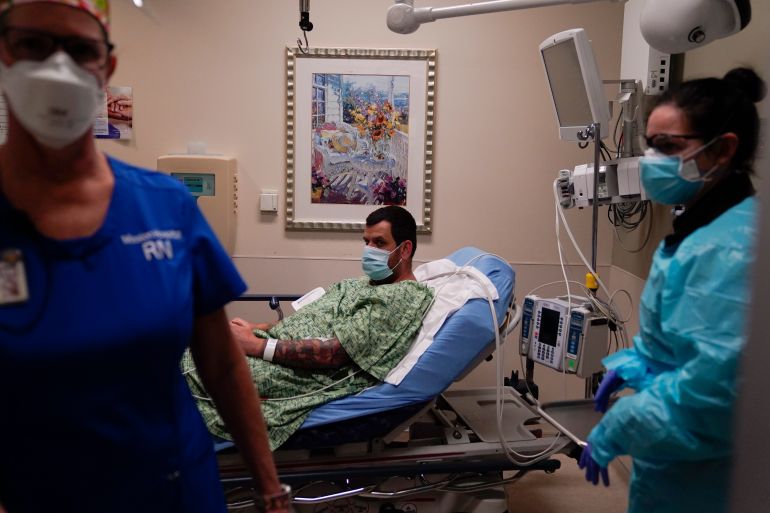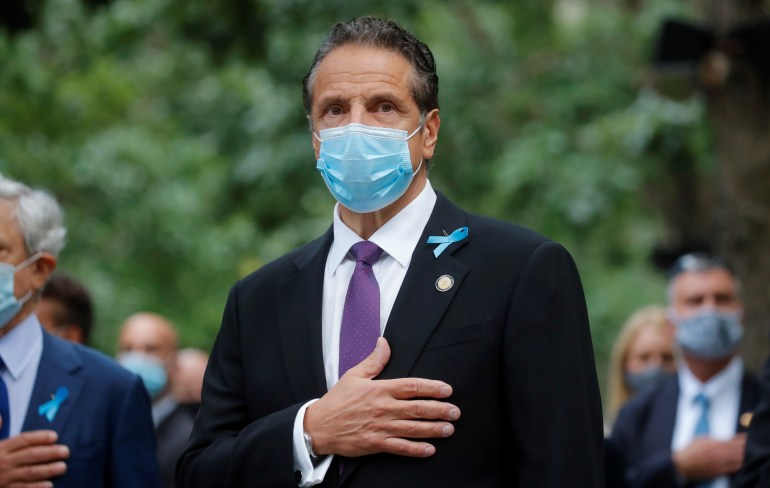US sees record COVID hospitalisations as vaccinations lag
US COVID-19 cases surpass 21 million, with many healthcare systems approaching breaking point.

More Americans were hospitalised with COVID-19 on Wednesday than at any time since the pandemic began, as total coronavirus infections crossed the 21 million mark, deaths soared across much of the United States and a historic vaccination effort lagged.
US COVID-19 hospitalisations reached a record 131,215 on Wednesday, according to a tally by The COVID Tracking Project, while 3,664 died on Tuesday according to Johns Hopkins University, one of the highest single-day death tolls of the pandemic.
Keep reading
list of 3 itemsUS vaccine roll-out’s next challenge: Verifying who is ‘essential’
US vaccine roll-out falls short of 20 million jabs by end of 2020
In hard-hit California, public health authorities ordered hospitals in more than a dozen southern and central counties overwhelmed with COVID-19 patients to suspend elective surgeries for at least three weeks.
The order, issued late on Tuesday by the state’s Department of Public Health, applies to 14 counties, including Los Angeles, Orange and San Diego, where hospital critical care capacity has been severely stretched.

Total US COVID-19 cases exceeded 21 million on Wednesday, according to Johns Hopkins University and with many healthcare systems approaching breaking point pressure is mounting on state and local officials to speed up distribution of the two authorised vaccines from Pfizer and Moderna.
The lack of a federal blueprint for the crucial final step of getting the vaccines to tens of millions of people has left state and local officials in charge of the monumental effort, creating a patchwork of different plans across the US.
The Department of Health and Human Services on Wednesday said the CDC would be providing $22 billion in funding to states, territories and cities across the country to support testing, contact tracing and containment. Of that, $3 billion will go to vaccination under the CDC’s Immunization and Vaccines for Children agreement.
“This funding is another timely investment that will strengthen our nation’s efforts to top the COVID-19 pandemic in America,” CDC Director Robert Redfield said in a statement. “Particularly now, it is crucial that states and communities have the resources they need to conduct testing, and to distribute and administer safe, high-quality COVID-19 vaccines safely and equitably.”

Some states have already called on extra resources to accelerate vaccine administrations. North Carolina Governor Roy Cooper on Tuesday mobilised the state’s National Guard to “provide support to local health providers” to more quickly distribute coronavirus vaccines.
“We will use all resources and personnel needed,” Cooper said in a statement.
Maryland Governor Larry Hogan also announced that emergency support teams from the state’s National Guard will lend a hand to local health departments in their vaccination efforts.
“At the current pace of allocation,” Hogan said, the state expects to be able to start vaccinating the priority group – people age 75 and older and front-line essential workers – by late January.
In New York City, where Mayor Bill de Blasio and Governor Andrew Cuomo have sparred about slow vaccine administration, officials said on Wednesday the city was ramping up its “vaccine hubs,” which would include 15 locations by January 16, five “mega-sites” among them. The sites will have the capacity to vaccinate 100,000 New Yorkers a week, officials said.
The ambitious goal comes as the city administered roughly 10,000 shots on Tuesday, according to data posted on Wednesday.
De Blasio also said at a news briefing that home health aides and some members of the New York Police Department could receive the vaccine for the first time on Wednesday.

After earlier this week laying blame on local officials for the sluggish pace of vaccinations at some New York hospitals, Cuomo said on Wednesday that the rate among hospital staff statewide has tripled to 30,000 inoculations a day since Monday.
Another three million doses of the two vaccines were sent to US states on Tuesday, acting Secretary of Defence Christopher Miller said in a statement, bringing the total to more than 19 million doses in 21 days, only a fraction of which have been administered so far.
Both authorised vaccines require two doses, three or four weeks apart. Healthcare workers in several states this week began getting their second dose of the Pfizer-BioNTech vaccine, which was approved prior to the Moderna shot.
A tremendous global vaccination campaign will be needed to establish a level of herd immunity that could put an end to the devastating pandemic raging across much of the US and many other countries, with more highly transmissible variants of the virus cropping up.